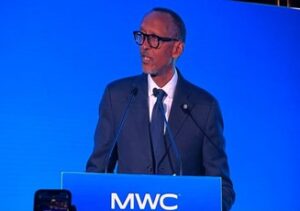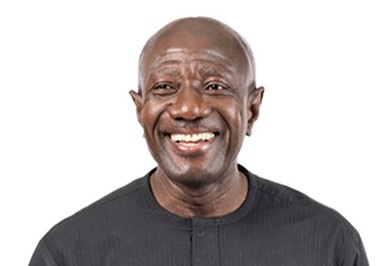Vice President, Markets, at MTN Group, Eben Asante has said that for Africa to be able to bridge the yawning digital gap and also leapfrog the risks that digitalization presents, stakeholders must move away from the rhetoric and start taking decisive and purposeful actions to get the job done.
He was delivering a keynote address at the just-ended Mobile World Congress Africa (MWCAfrica) 2023 at the iconic Kigali Convention Center in Rwanda. The theme for the three-day conference was Velocity: Unleashing Tomorrow’s Technology Today, and it focused on four key sub-themes of Accelerate Africa, Fintech, Healthtech and Powering Digital.
What emerged prominently in all the keynote addresses and sessions over the three-day period was that there is a huge connectivity gap in Africa, and even among the few who are actually connected, just about 25percent use data, which leaves a yawning usage gap due to a number of factors, mainly affordability, lack of digital skills, relevance (language barrier), and safety/security concerns.
The significance of Rwanda hosting the industry gathering, was however the silver lining, in that Rwanda is largely revered for being a good example of what practical and decisive actions as well as real public-private sector collaboration is doing to bridge the digital gap in Africa.
Indeed, Eben Asante, like other speakers noted that “…Rwanda presents a living and seminal example to the continent and the world” on what African countries must to do to bridge the digital gap.
The digital gap
He noted that per recent GSMA reports, more than 75percent of people in Africa are not connected, which is almost a billion people including half of the adult population and several children.
Eben Asante also stated that per MTN’s own readings, about 90percent of connected people use their phones for mainly voice calls, while a combined usage of phones for voice, data and digital finance (mobile money) is below 20percent. “So the digital divide is real and it is clear and there is much work to be done by us all,” he said. “The future looks very challenging but also presents opportunities in health, agriculture, education, financial services, government and governance, industry and everyday life for African citizens,” he said.
He said it is time for African countries to stop describing the challenge they face as a digital gap because “it is more about bridging the gap of inhumanity: rural-urban gap, male-female gap, the north and south gap, the haves and have nots gap – that is the real gap of inhumanity we must bridge with digitalization as a tool.”
What MTN is doing
Eben Asante said MTN is already committed to closing the coverage and usage gaps, adding that just last year MTN brought some 45 million people under coverage in 3G and 4G, with nine million of them being under 4G alone. “We covered 88percent of the population last year and by 2025 we have a target to cover 95percent of the population with advanced technology,” he said.
MTN, according to him, has also reduced its effective data prices by 22percent across board and is working towards a ‘digitalizing everything economy’ by collaborating with Mastercard to reach at least 100 million Africans with mobile finance services by year 2025.
Enabling environment
He however noted that all the great plans operators like MTN have would require an enabling environment by governments, as well as the right partnerships and collaborations. In terms of creating an enabling environment, Eben Asante said MTN has a number of proposals:
Spectrum
First, government spectrum roadmaps should ensure sufficient spectrum to meet the sharp rise in demand for mobile and data services, and that should include speedy access to mid-band spectrum, particularly 3.5MHz, given its importance to the future of 5G low latency to support the digitalization of everything work. “There is also a need to prioritize the acceleration of access to sub-1GHz spectrum to provide widespread rural mobile broadband service,” he said.
Taxes
Secondly, there is a need to apply best pro-digital-growth tax, tariff and fiscal principles to facilitate the rapid digitalization, adding that “we should not strain the goose that lay the golden eggs.”
Regulation
Eben Asante also emphasized the need for a “fair and transparent regulatory regime”, which he said requires a continuous dialogue even as technologies such as those in non-terrestrial gain interest.
Speaking of non-terrestrial technology gaining interest, Elon Musk’s Starlink is gradually rolling out its satellite-enabled internet services in Africa, and there have been hints of him turning his X (Twitter) platform into a payments platform, which will then make it difficult for regulators to keep him in check. Some experts have earlier said that this requires dialogue, like Eben Asante said, and not a high-handed regulatory stance.
Power supply
Lastly, Eben Asante thinks African governments need to facilitate the provision of reliable and efficient grid power and energy mixes to power the digitalization drive. “With these policy changes in place, we will be able to work side by side with you all as the continent leapfrogs previous generations in adopting digital solutions faster and, more importantly, out of necessity,” he said.
Rwandan example

In his keynote address, President of Rwanda, Paul Kagame related how his government created the enabling environment for Airtel Rwanda and MTN Rwanda to provide very affordable data packages that is “within the reach of every Rwandan”.
Based on the enabling environment, including the removal of nuisance taxes and other pragmatic policy frameworks by the Rwandan government, MTN Rwanda has rolled out a scheme called Macye Macye, which enables ordinary Rwandans to buy 4G enabled smartphones on credit and also receive very affordable data packages.
The Rwandan government also facilitated a $20 million grant from the Co-Founder and Executive Chairman of Netflix, Wilmot Reed Hastings Jr, that has enabled Airtel Rwanda to provide 4G LTE smartphone at an affordable price of $16.7, plus 1G data per day at only $1.










